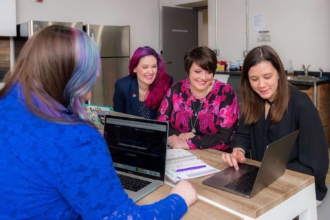Have you been asked to mentor a student teacher? Does the responsibility of such a task make you nervous?
If so, you aren’t alone. Janelle Cox, a contributor at TeachHUB.com, notes that many teachers are reluctant to mentor because “they are unsure on how to best prepare the student teacher.” And that concern isn’t entirely unfounded.
Being a mentor isn’t easy. It requires time, energy, and a commitment to embrace a new teacher and give them your best. You must be prepared to be a positive inspiration and a hands-on mentor who is willing to give up control of the classroom.
But there are also significant rewards to being a mentor. Teaching colleagues Greg Armamentos and Jen Houlette note that mentoring can give veteran teachers
- A fresh perspective and a source of new ideas
- The energy a new teacher brings into the classroom
- The opportunity to talk through daily challenges with a colleague
- The capacity to spend more time with individual students
With the right frame of mind and some preparation, it’s possible to create an invaluable learning experience for your student teacher while maximizing their value to you and your students.
Collaborate with student teachers on lesson plans
Mentoring a student teacher not only provides them with an opportunity to learn from a veteran teacher, but also gives you a chance to gain a different perspective on teaching.
Your student teacher is inevitably going to have a different approach than you (and perhaps some fresh ideas for lessons). This can be a valuable asset for you and your students because a new approach has the potential to improve the effectiveness of your lessons and, consequently, how much your students learn.
While student teachers aren’t going to be creating lesson plans on their own at the beginning of their internship, they will by the end of it. So it can be beneficial to collaborate on lesson plans throughout the semester, incorporating your veteran ideas with the student teacher’s new ideas.
Illinois teacher Kimberly Long encourages this kind of mutually beneficial collaboration because you both gain new and improved strategies, lessons, and ideas.
Involve them in your data collection
Student data plays a big role in education today.
Teachers collect data that allows them to better understand their students, identify students’ strengths and weaknesses, and create personalized learning experiences to optimize students’ retention of information.
With data becoming more pivotal to teaching, it’s important that student teachers understand the types of data that are valuable in a classroom. Whatever your data-collection practices are, involve your student teacher in those processes. Demonstrate how to mine and interpret the data in ways that improve teaching and student learning.
And while you are working with student teachers, ask for their thoughts and feedback about your classroom data practices. They may have some fresh insights about data collection and analysis that you haven’t considered.
At the end of a collaborative semester, you may improve your data processes and advance your student teacher’s understanding of the practical applications of data in the classroom.
Delegate classroom management
Managing a classroom is probably going to be the most valuable lesson your student teacher will learn during their time with you. And turning over the management of your classroom will probably be the most difficult part for you.
It is possible to find a balance that allows you to ensure your goals are met while allowing the student teacher a real opportunity to cultivate their teaching style.
The biggest challenge for the student teacher is establishing authority with the students who are accustomed to you being the teacher. Having two teachers in the classroom can be uncomfortable because of different management and teaching styles, notes educator and educational coach Angela Watson. This is why it’s important for the mentor teacher to take a backseat once the student teacher is managing the class.
That doesn’t mean you should be detached from what is happening in class. By staying engaged in the classroom, you may learn new teaching strategies, management techniques, and ways to connect with your students. In the process, you can become a stronger teacher.
It isn’t easy to be a good mentor. Mentoring requires you to take a student teacher by the hand and immerse them in your classroom. “The best mentors show, rather than tell, their colleagues what good practice looks like,” says Brian Gatens, superintendent of Emerson Public Schools in the greater New York City area.
But your efforts aren’t
Photos by Startup Stock Photos & rawpixel.com from Pexels
Photo by Capturing the human heart. on Unsplash













Send Comment: